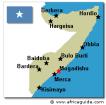Somalia and Ethiopia to be Unified?
The Militarization of the Horn of Africa

Editorial Note
Ignored by the majority of media sources is the coordinated and synchronized involvement and intervention of both Ethiopian and American military forces and intelligence operations in the Horn of Africa.
The timing of the intervention of Ethiopian troops, supported by the Anglo-American alliance, into Somalia was also originally denied by the Ethiopian government who seemingly lied to African and Arab journalists and mainstream media when asked if Ethiopian troops were operating inside Somalia.
The crisis in Somalia and East Africa, triggered by U.S. interventionism is intimately related to events in the Middle East in what could become a major regional war against Iran, Syria, and their regional allies.
Ethiopia is acting as an agent of Anglo-American policy and objectives in the Horn of Africa. The Somalian Transitional Government is also subservient to Anglo-American edicts and is claiming that it is fighting terrorists, just as the puppet Iraqi government is claiming that the Iraqi Resistance is nothing but a group of terrorists. It also appears marshal law is being imposed over Somalia with the help of Ethiopian troops and covertly by the United States.
Additionally, what the mainstream media fails to report about is the U.S.-backed Somali government’s attempts at merging Somalia and Ethiopia with unified borders, a single currency, joint management, a single passport, and a joint military force.
Finally it must be noted that Somalia, like Sudan, is both an African and Muslim country with large oil reserves that have not been tapped into yet. Somalia, also like Sudan, is conflict ridden, and its roots are linked to oil reserves.
Global Research presents the following two articles, focussing on the backdoor negotiations taking place at a time of intense fighting and manoeuvres in the Horn of Africa.
The Transitional Federal Government of Somalia has also been accused of collaborating in the division of Somalia and being a client of the United States and other foreign powers by Somali Parliamentarians and citizens.
Global Research, 13 January 2007
Somalia and Ethiopia to be united, says Somali Minister
SomaliNet
January 2, 2007
Mohamed Abdi Farah
Hussein Mohamed Aideed, the Interior Minister of the Transitional Federal Government has said on Tuesday the government wants Somalia and Ethiopia to share a single passport and wipe out the boundary between the countries – citing the unity of European countries as one nation and share one currency.
Mr. Aideed who met today with clan and traditional elders in the former presidential palace in the Somalia capital, Mogadishu, said since Somalis and Ethiopians are brothers and both countries share 2000 km long border my government would suggest to use a single passport in the two countries and a unified security force because there is blood relations between both communities in Somalia and Ethiopia.
“There are thousands of Somali refugees living in Ethiopian and who hold Ethiopian passports who can travel everywhere in the world,” Mr. Aideed said.
Hussein Aideed said 60% the Somali refugees are in Ethiopia and argued that nothing can prevent us from joining hands with Ethiopia since they came to help us from thousands miles away.
The Interior Minister asked the elders to welcome the Ethiopian forces helping the government in restoring peace and stability.
He said the Ethiopians should be seen as friends and not as enemies. “Ethiopia is the only country which supported Somalia out of the problem,” he said.
December 10, 2006, some members of the transitional parliament in Somalia put on view publicly a map which they said secretly stolen from the office of Prime Minister Ali Mohamed Gedi in Baidoa. The map shows all countries in African continent with Ethiopia annexing Somalia. But the premier Gedi denied the allegation as false paper.
Somalia Parliament rebuffs Government Plan
SomaliNet
January 2, 2007
Mohamed Abdi Farah
Members of the Transitional Parliament based in Baidoa city southwest of the Somalian capital Mogadishu on Thursday debated about the state of emergency plan put forward by the government that is to be imposed on the country.
The lawmakers concluded their session in deadlock. Some demanded amendment of the plan describing it as causing conflict among the people. After a long debate, a technical committee headed by Osman Elmi Boqore was appointed to solve the stand off.
Osman Elmi Boqore, the Second Deputy Parliament Speaker was chairing the Parliament session in which the MPs rebuffed some of the agendas presented.
They called for the removal of some of the agendas that they said can spark divisions.
The Parliament will assemble again on Saturday to implement the martial law plan, which will be imposed on Somalia for three months.

